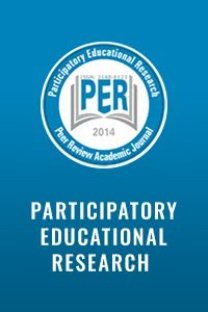A Systematic Analysis on Graduate Theses Published in The Field of Computer Programming in K-12 Education Between 2018 and 2022
A Systematic Analysis on Graduate Theses Published in The Field of Computer Programming in K-12 Education Between 2018 and 2022
programming, K-12, theses, content anlysis,
___
- Akpınar, Y. ve Altun, Y. (2014). Bilgi toplumu okullarında programlama eğitimi gereksinimi. İlköğretim Online, 13(1), 1-4.
- Alp, Y. (2019). Blok tabanlı programlama öğretiminin ortaokul öğrencilerinin problem çözme becerisine ve bilgisayara yönelik tutumuna etkisi. Yüksek lisans tezi, İnönü Üniversitesi, Malatya.
- Benzer, A. İ., & Erümit, A. K. (2017). Programlama öğretimine yönelik lisansüstü tezlerin incelenmesi. Journal of Instructional Technologies & Teacher Education, 6(3), 99-110.
- Bowen, G. A. (2009). Document analysis as a qualitative research method. Qualitative Research Journal, 9(2), 27-40. Büyüköztürk Ş., Kılıç Çakmak E., Akgün E. Ö., Karadeniz Ş. ve Demirel F. (2021). Bilimsel Araştırma Yöntemleri. Ankara: Pegem Akademi
- Çakıroğlu, Ü., Sarı, E. & Akkan, Y. (2011). The View of the Teachers about the Contribution of Teaching Programming to the Gifted Students in the Problem Solving. Paper presented at 5th International Computer & Instructional Technologies Symposium (22-24 September), Fırat University, Elazığ.
- Çatlak, Ş., Tekdal, M., & Baz, F. Ç. (2015). Scratch yazılımı ile programlama öğretiminin durumu bir doküman inceleme çalışması. Journal of Instructional Technologies & Teacher Education, 4(3), 13-25.
- Çelik, Ş. B. (2019). Robotik programlama eğitiminin ortaokul öğrencilerinin eleştirel düşünme becerilerine etkisi. Yüksek lisans tezi, Süleyman Demirel Üniversitesi, Isparta.
- Deniz, G., & Eryılmaz, S. (2019). Türkiye'de programlama eğitimi ile ilgili yapılan çalışmaların incelemesi: Bir betimsel analiz çalışması. Eğitimde Kuram ve Uygulama, 15(4), 319-338.
- Gökçearslan, Ş., & Alper, A. (2015). The effect of locus of control on learners' sense of community and academic success in the context of online learning communities. The Internet and Higher Education, 27, 64-73.
- Gök, T. & Sılay, İ. (2005). Lisansüstü eğitime yüksek lisans ve doktora koşullarının irdelenmesi üzerine bir çalışma, lisansüstü eğitim. Dokuz Eylül Üniversitesi Buca Eğitim Fakültesi Dergisi, Özel Sayı 1, 137-140.
- Gülbahar, Y. (2017). Bilgi İşlemsel Düşünmeden Programlamaya. Ankara: Pegem Akademi
- Kukul, V., Gökçearslan, Ş., & Günbatar, M. S. (2017). Computer programming self-efficacy scale (CPSES) for secondary school students: Development, validation and reliability. Eğitim Teknolojisi Kuram ve Uygulama, 7(1), 158-179.
- Konan, F. (2020). Programlama öğretimine yönelik bir içerik analizi. Yüksek lisans tezi, Erzincan Binali Yıldırım Üniversitesi, Erzincan.
- MEB. (2018). Ortaokul ve imam hatip ortaokulu bilişim teknolojileri ve yazılım dersi (5, 6, 7 ve 8. sınıflar) öğretim programı. Ankara: MEB Talim ve Terbiye Kurulu Başkanlığı
- MEB. (2018). Bilgisayar bilimi dersi öğretim programı kur 1-kur 2. Ankara: MEB Talim ve Terbiye Kurulu Başkanlığı
- Miles, M.B. & Huberman, A.M. (1994). Qualitative data analysis. California: SAGE Publications Inc.
- Rovshenov, A. (2020). Programlama eğitimi ile ilgili yapılan araştırmaların içerik analizi. Yüksek lisans tezi, Ege Üniversitesi, İzmir.
- Tiryaki, A. (2020). Robotik kodlama eğitiminin ortaöğretim öğrencilerinin programlama öz yeterlik düzeylerine ve yaratıcı düşünme becerilerine etkisi. Yüksek lisans tezi, Hatay Mustafa Kemal Üniversitesi, Hatay.
- Ünsal, İ. (2020). Blok tabanlı programlama etkinliklerinin ilkokul 2.sınıf öğrencilerinin bilgi işlemsel düşünme becerisi ve etkinlik algısı üzerine etkisi. Yüksek lisans tezi, Sakarya Üniversitesi, Sakarya.
- Yiğit, B. (2021). Programlama eğitimi araştırmalarında bilimsel eğilimler: bir içerik analizi örneği. Yüksek lisans tezi, Yıldız Teknik Üniversitesi, İstanbul.
- ISSN: 2148-6123
- Yayın Aralığı: Yılda 6 Sayı
- Başlangıç: 2014
- Yayıncı: Özgen KORKMAZ
The Effect of Gamified Adaptive Intelligent Tutoring System Artibos on Problem-Solving Skills
İsmail ÇETİN, Ali Kürşat ERÜMİT, Vasif NABİYEV, Hasan KARAL, Temel KÖSA, Mehmet KOKOÇ
Self-Confidence as the Predictor of Metacognitive Awareness in High School Students
Kayhan BOZGÜN, Meltem AKIN KÖSTERELİOĞLU
Effects of Using the Staged Self-Directed Learning Model at Distance English Learning
Aşkay ATASEVER, Levent ÇELİK, Yüksel EROĞLU
Sumru AKCAN, Yasemin KIRKGÖZ, Ceylan ERSANLI
Tansel YAZICIOĞLU, Deniz AKDAL
Examining the Achievement Test Development Process in the Educational Studies
